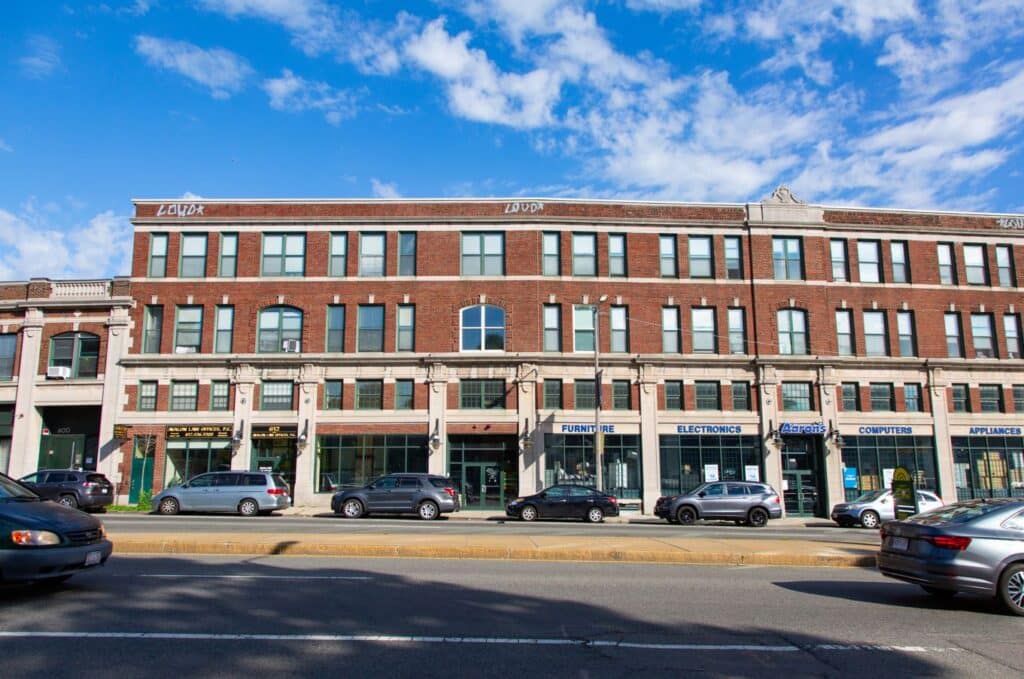Combining Two Boston Properties to Achieve Efficiencies

By Mark Fogarty
6 min read
One way to achieve economies of scale in affordable housing is to acquire two adjacent properties, renovate both and then run them as a single entity.
That’s what Affordable Housing and Services Collaborative (AHSC) is doing in Dorchester, MA, a neighborhood of Boston.
The Columbia West and Uphams Corner developments, which are less than a mile apart on Dorchester’s Columbia Road, were bought in 2017 and 2018 by nonprofit AHSC and will be known as Columbia Uphams under the merger and rehab. The plan is for $20 million in direct construction improvements to the two properties.

Michael Mattos, executive director of AHSC, says physical and financial issues made it more practical to reposition the two similarly sized properties as one (Columbia West has 46 units while Uphams Corner has 45, and each property has four stories). This allows for one management contract, audit and tax return, he says. But “it took a while,” Mattos acknowledges, going through a process with the city of Boston and trying to obtain four percent Low Income Housing Tax Credits. AHSC spent about $100,000 a year to keep the properties open before the redevelopment started.
He says AHSC has a management and development partner, Peabody Properties, that it shares a long-term strategic relationship with. Members of Peabody Properties founded AHSC.
Peabody Properties was managing the Uphams Corner property for a previous ownership group and was aware that the other partnership (made up of a for-profit and nonprofit) was dissolving, Mattos says, leading up to the acquisition. The purchase of Columbia West followed a year later.
“Rather than do it as two separate projects and have two separate costs for everything, we decided it made more sense to consolidate both buildings under one LLC,” says Mattos.
“We finally got our application funded in 2023 and were awarded the resources that we needed,” says Mattos. The closing occurred in September 2024.
A Long Time Coming
“It’s been a long time coming for us but now we’re under construction as an occupied renovation. We have a handful of vacancies, and based on a resident needs assessment, we are using some of those units as “hotel units” for residents to stay in temporarily while their units are being renovated. Other vacant units are being used as common areas so people can go and use them as daytime spots while their units are being renovated,” says Mattos.
An August 2025 completion is forecast for both buildings, which have income limits between 30 and 60 percent of area median income.
Mattos notes this was a complicated project, but says his firm had others, too.
“It’s always complicated when you have an existing building with existing tenants,” he says. “There’s a lot of logistical things you have to be aware of. We’re disrupting 91 households. We have to dance around all that!”
In another complication, the Uphams Corner building is a historic structure, a former market dating back nearly 100 years. “We’re bringing it into this century,” says Mattos, noting they’d been able to get State and Federal Historic Tax Credits for the project.
The former owner did a LIHTC syndication on the historic property in the early 2000s, but by now “it is primed to be resyndicated,” he says.
Columbia West, built in 2003, now looks tired, Mattos says, and is ready for lots of efficiency upgrades, including solar on the roof.
This will improve residents’ lives now “and hopefully for generations to come.”
There’s an additional complication at Uphams Corner, a condominium structure that allows for commercial properties there, such as a law office and charter school.
“We are the residential condo owner,” says Mattos.
TDC Nearly $50 Million
Total development cost is $48.3 million, Mattos says, $33 million if you back out acquisition costs. That includes hard and soft costs.
The biggest source of funds was a $20 million construction loan from MassHousing. It also received $16.4 million in Federal LIHTC equity, $4 million in State LIHTC equity and $4 million in State and Federal HTCs.
That $24 million in total equity financed a full 50 percent of the TDC, Mattos points out. An additional $8 million came from subordinate soft debt from the Massachusetts Executive Office of Livable Communities (EOHLC) and City of Boston sources.
AHSC also got accrued interest forgiven on a large amount of assumed debt, $6.3 million between the two buildings.
Mattos says the properties are occupied by families, and that there are a lot of children there. It’s “truly a mix,” with some families getting subsidies and some not. He says, “It’s a good group of residents” in low-vacancy projects.
MassHousing is also providing $3.9 million in permanent financing and $1.1 million in subordinate financing. The city of Boston is providing $885,818 in Neighborhood Housing Trust financing.
Additional funding includes $4.5 million in direct support from the Massachusetts EOHLC (which supplied the tax credit allocations), $4.6 million in seller financing, $2 million from the Affordable Housing Trust Fund and a $173,527 sponsor loan, from AHSC. The tax credit investor is Boston Financial Investment Management LP.
AHSC says the combined housing is near MBTA bus service to the JFK/UMass station on the Red Line and Commuter Rail. Commuter rail service is also less than a mile away at the Uphams Corner Commuter Rail station on the Fairmount Line.
“Among the planned property improvements are the overall performance of the building envelopes by replacing windows and doors, installing new roofs and roof insulation, new HVAC systems, Energy Star-rated appliances, low-flow faucets, showerheads, and toilets, LED lighting, and a new security system at both properties. Other improvements include new kitchen and bathroom cabinets, countertops and flooring, elevator modernization and brick repointing at Uphams Corner Market,” according to the company.
Parking spaces are being provided: 42 for the Columbia property, and 17 at Uphams Corner.
Twenty-three units will have project-based rental assistance, of which 14 will have a Section 8 Housing Assistance Payment contract with the Boston Housing Authority, eight will have Massachusetts Rental Voucher Programs vouchers, and one will receive rental assistance and 24-hour tenant services through the Department of Housing and Urban Development’s Continuum of Care program for homeless individuals and families.
There are 14 studio apartments, 20 one-bedroom apartments, 49 two-bedroom apartments, seven three-bedroom apartments and one four-bedroom apartment, according to AHSC. The general contractor will be NEI General Contracting, the architect The Architectural Team and Peabody Properties will be the management agent.
The experience here has not scared AHSC off, Mattos says. The firm has acquired five properties—three in New Bedford, MA—where they plan to do something similar. That’s not to say they will be easy.
“They’re complicated. They’re not easy, but the end result is worth it” Mattos concludes.